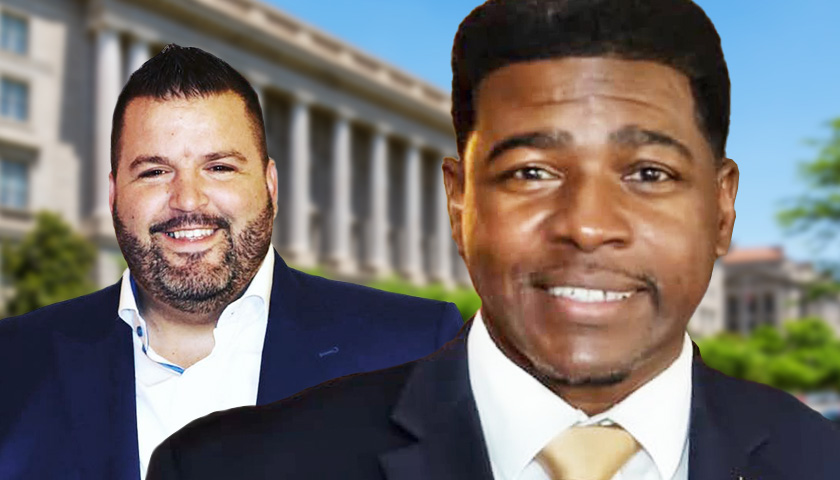The Wisconsin-based, “freethought” watchdog Freedom From Religion Foundation (FFRF) filed a complaint with the IRS against the Redeemer Apostolic Church in Mesa after pastor and CD 4 candidate Jerone Davis appeared at a prayer revival event hosted by America’s Revival, which is separate from the church. Davison was endorsed there by the founder of America’s Revival, Pastor Joshua Feuerstein. The FFRF wants the church’s tax-exempt status revoked, asserting that it crossed the line into the type of political activity that nonprofit 501(c)(3)s are prohibited from engaging in.
Feuerstein, who is not on staff with the church, told The Arizona Sun Times it was part of an effort pastors are making around the country to push back and show they’re not afraid of exercising their First Amendment rights. “Unlike other cowardly clergy, I refuse to be silenced or muzzled by any government entity, including the IRS. If they did it would be an absolute violation of my First Amendment rights. It’s why I’m challenging them to the fight and why they won’t fight me …. When I prevail, every other pastor would realize that the IRS are toothless tigers … and they don’t want anyone to know that.”
According to the FFRF, which linked to a video of the event that has subsequently been taken down, Feuerstein stated, ‘I’m going to do something illegal. The IRS tells me that because I’m a preacher, then I’m legally not allowed to endorse a candidate… I’m just going to say this and broadcast it around the world, and I’m going to look the IRS right in the face: ‘My name is Joshua Feuerstein, the founder of America’s Revival, and tonight I officially endorse Jerone Davison for Congress of the United States of America.’ And let me say to the IRS: ‘Come at me, bro.’”
The FFRF complained that the church allowed Davison “to address the audience to promote his campaign.” However, the complaint did not cite anything he said. The FFRF alleges that this wasn’t the only incident, the church “has invited multiple political candidates and preachers to speak to its members and endorsed those candidates.”
IRS Rev. Rul. 2007-41, 2007-25 I.R.B. states that 501(c)(3) organizations, which include churches and other religious organizations, are prohibited from “[participating in or intervening in] . . . any political campaign on behalf of (or in opposition to) any candidate for public office.”
However, only in very rare instances have churches lost their tax-exempt status over merely endorsing candidates or discussing politics. The IRS doesn’t interpret the regulation broadly, apparently choosing to limit it to significant amounts of campaign work.
Last year, some megachurches in Texas announced the names of members who were running for office. A member in one of the churches encouraged others to vote for two school board candidates, saying they must be elected because they stand against “critical race theory” and in support of “freedom of speech and religion.”
In one of those situations, a pastor who had endorsed two candidates, Rev. Landon Schott at Mercy Culture Church, said his endorsements were personal and he wasn’t speaking on behalf of the church — he said doing so would jeopardize the church’s non-profit status.
Televangelist James Robison, a pastor who consulted regularly with former President Donald Trump, states that pastors “certainly have a God-given right to do so and no one understood this better than our founding fathers. When a preacher or highly visible person endorses a candidate, that is their right and we should all respect them even if we disagree with their opinion.”
Hundreds of pastors have been deliberately endorsing political candidates in recent years, in order to challenge the IRS over its regulations through the legal system. Some even mail their sermons to the IRS, but never get a response.
The Alliance Defending Freedom and Family Research Center (FRC) lead a “Pulpit Freedom Sunday” once a year before elections asking pastors to exercise their First Amendment right to speak about politics, including discussing candidates. The FRC’s Watchmen on the Wall site states, “Traditionally, Pulpit Freedom Sunday pastors have spoken directly and scripturally about candidates, and that is your constitutional right.”
Davison is running for Congress against several other Republicans, with the winner facing incumbent Rep. Greg Stanton (D-04-Ariz.). His faith is a big part of his platform and he regularly provides the prayer at local political events.
Feuerstein has been a target of the left due to his activism, such as exposing Starbucks in 2015 for taking “Christ and Christmas off of their brand-new cups,” serving plain red cups instead over the holiday. He ramped up a campaign against Starbucks, telling baristas his name was “Merry Christmas” to get them to say it aloud.
Feuerstein was one of several pastors who spoke at the U.S. Capitol on Jan. 5, 2021, resulting in the FBI investigating him. One of his most popular videos on YouTube is titled “$100,000 ATHEIST CHALLENGE: Can YOU prove him wrong.” The left has not been very successful going after him; one highly touted Facebook page they put up about him has been shut down.
Dr. Robert Jeffress, the nationally renowned pastor of First Baptist Church in Dallas, warned earlier this year, “I predict, with some knowledge, that the IRS is going to say when you preach certain things, or allow certain things to be said from your pulpit, that’s politics and therefore disqualifies you from tax-exempt status.” Jeffress endorsed Rick Perry for president in 2011, placing his endorsement on the church website, but was not penalized.
Mat Stever of Liberty Counsel, one of the main religious freedom organizations representing churches and pastors in this area, agreed. “Under the Biden administration, I have no doubt that the IRS has been directed to look at nonprofits and churches to try to hassle them and intimidate them into silence,” he said, “particularly during the upcoming election cycle.”
Republicans in Congress have tried unsuccessfully to change the IRS’s regulations in this area to make it clearer that pastors and churches do not need to fear violating IRS regulations over what has been considered and treated for years as traditional First Amendment interaction with political candidates.
– – –
Rachel Alexander is a reporter at The Arizona Sun Times and The Star News Network. Follow Rachel on Twitter. Email tips to [email protected].
Photo “Jerone Davison” by Christine Ong Cothrun. Photo “Joshua Feuerstein” by Pastor Joshua Feuerstein. Background Photo “Internal Revenue Service” by Tony Webster. CC BY 2.0.





